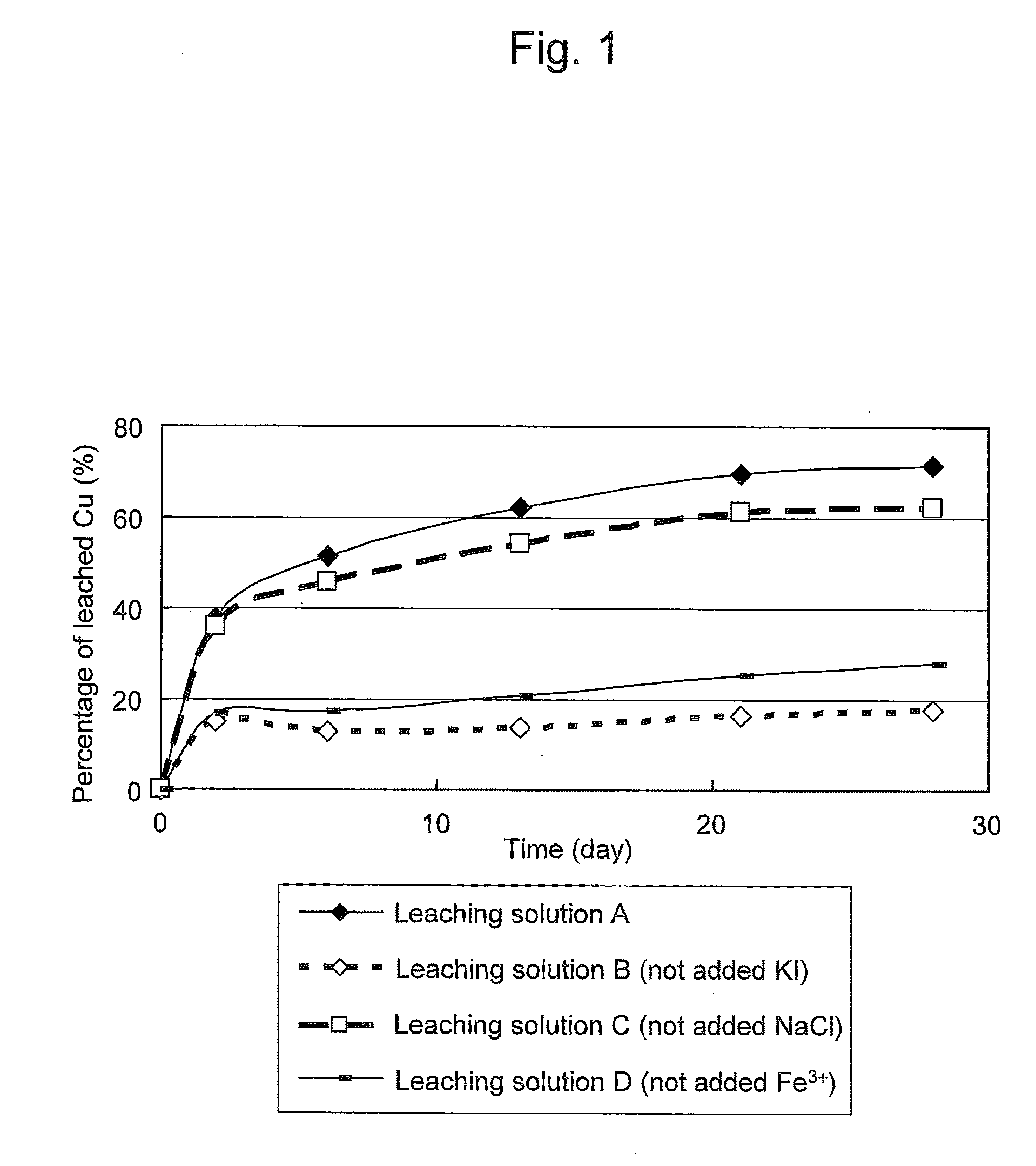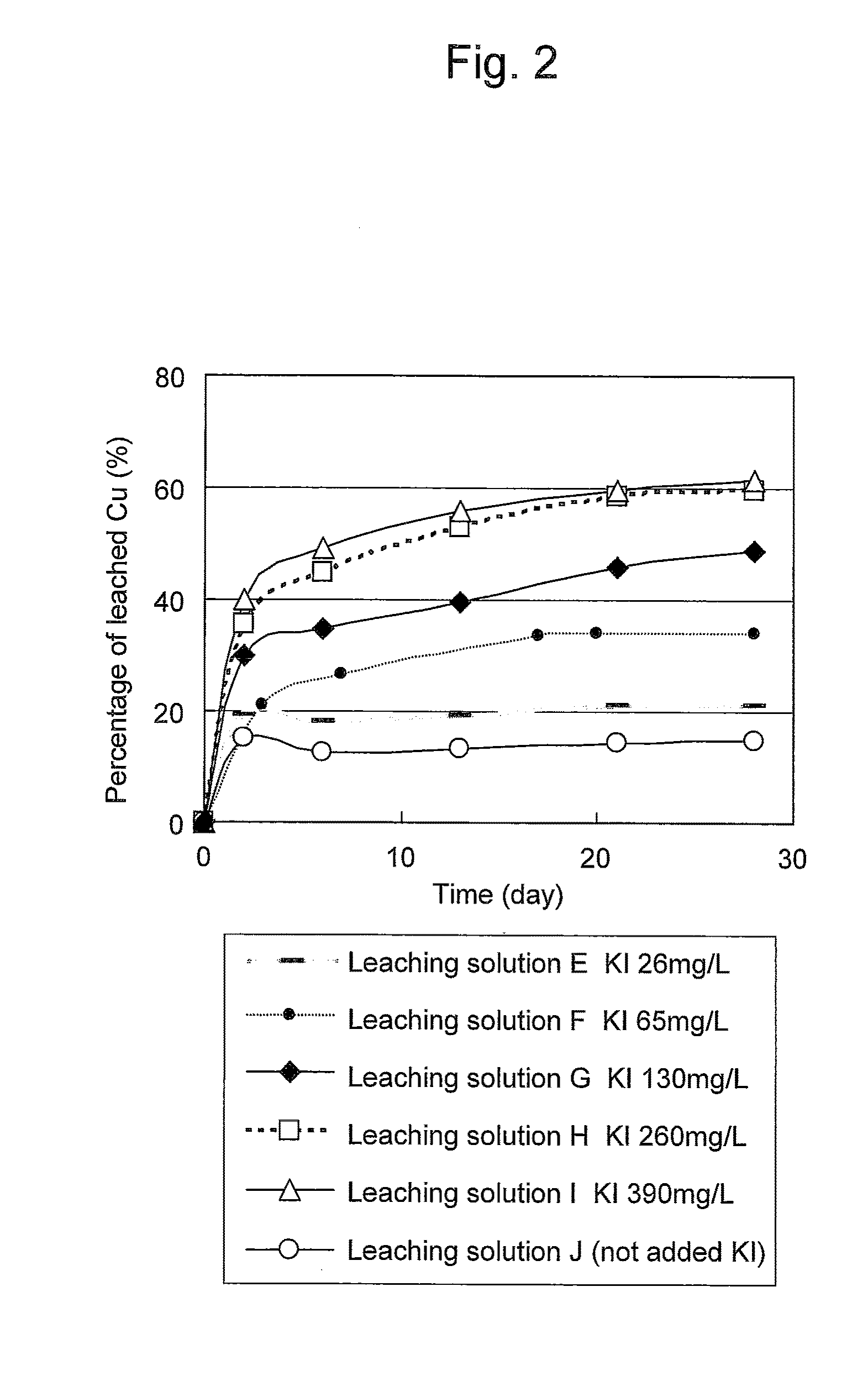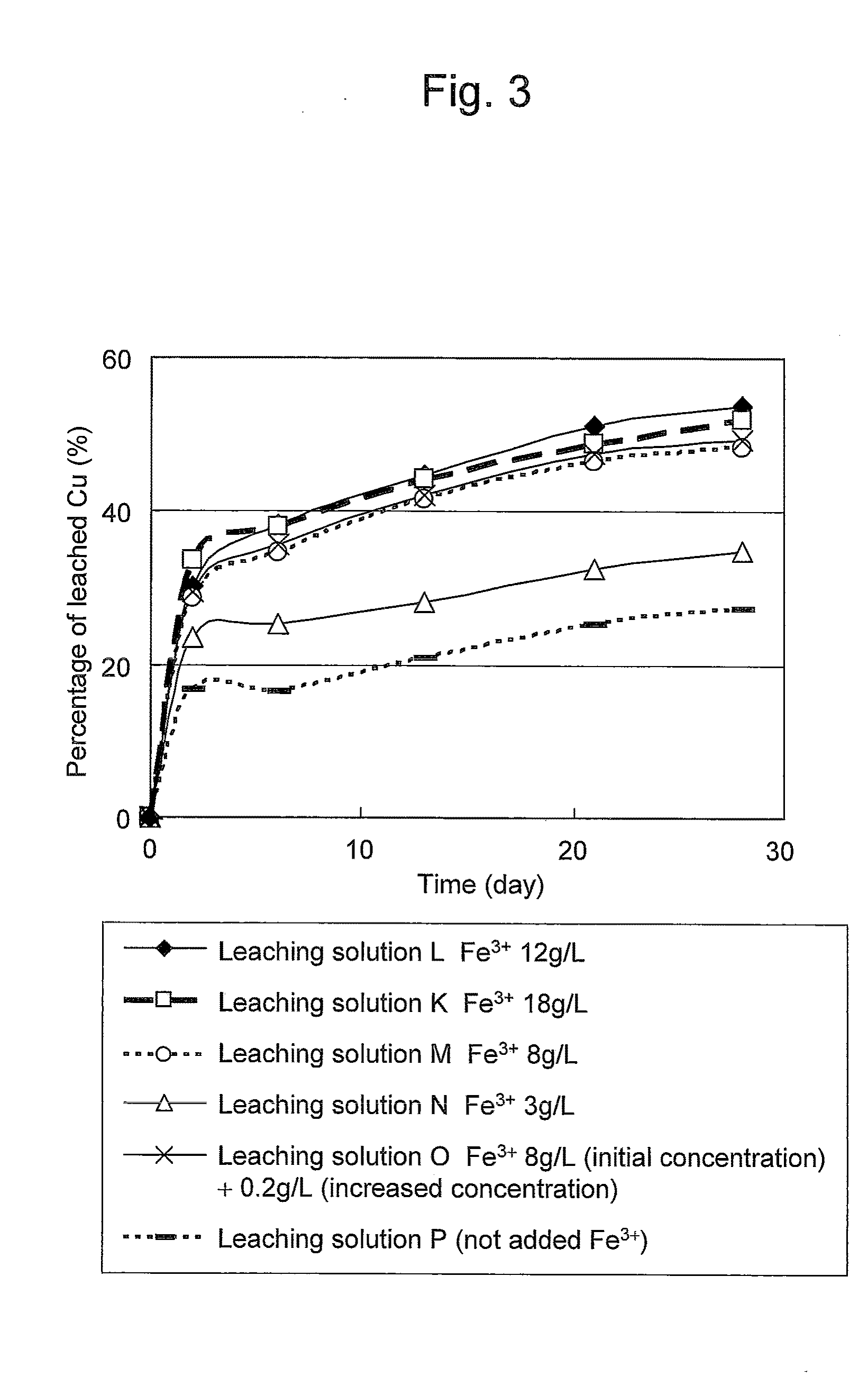Method of leaching copper sulfide ore with the use of iodine
a technology of iodine and copper sulfide ore, which is applied in the direction of copper sulfates, separation processes, dissolving, etc., can solve the problems of significant decrease in the leaching rate, inability to carry out a conventionally proposed control of oxidation-reduction potential, and difficulty in efficiently carrying out copper leaching from a copper sulfide ore containing chalcopyri
- Summary
- Abstract
- Description
- Claims
- Application Information
AI Technical Summary
Benefits of technology
Problems solved by technology
Method used
Image
Examples
example 1
Copper Leaching Promoting Effects of Iodine, Ferric (III) Ions, and Chloride Ions
[0036]A concentrate (mined in Candelaria) containing chalcopyrite as a main constituent was used as a target ore. The quality of the concentrate was as follows: Cu=28% by mass; Fe=28% by mass; and S=32% by mass.
[0037]Three grams of the above concentrate was mixed with 300 mL of a leaching solution that had been adjusted to a pH of 1.8 with sulfuric acid and poured into a 500 mL Sakaguchi flask.
[0038]Leaching solutions A to D were each prepared in a manner such that potassium iodide, ferric sulfate (III), and sodium chloride were added (or not added) to a leaching solution in the above flask at the corresponding concentrations described below. Each leaching solution was gently shaken at an ordinary temperature for leaching copper from a copper concentrate.
(Leaching Solution A)
[0039]Potassium iodide: 130 mg / L (iodide concentration: 100 mg / L)
[0040]Ferric sulfate (III): 18 g / L (Fe3+ concentration)
[0041]Sodi...
example 2
Copper Leaching Effects Obtained at Different Iodine Concentrations
[0053]Leaching solutions E to J were each prepared in a manner such that potassium iodide and ferric sulfate (III) were added (or not added) to a leaching solution (provided that the pH was adjusted to 1.5) in the above flask described in Example 1 at the corresponding concentrations described below. Each leaching solution was gently shaken at an ordinary temperature for leaching copper from a copper concentrate. In this Example, sodium chloride was not added.
(Leaching Solution E)
[0054]Potassium iodide: 26 mg / L (iodine concentration: 20 mg / L)
[0055]Ferric sulfate (III): 7 g / L (Fe3+ concentration)
(Leaching Solution F)
[0056]Potassium iodide: 65 mg / L (iodine concentration: 50 mg / L)
[0057]Ferric sulfate (III): 7 g / L (Fe3+ concentration)
(Leaching Solution G)
[0058]Potassium iodide: 130 mg / L (iodine concentration: 100 mg / L)
[0059]Ferric sulfate (III): 7 g / L (Fe3+ concentration)
(Leaching Solution H)
[0060]Potassium iodide: 260 m...
example 3
Copper Leaching Effects Obtained at Different Ferric (III) Ion Concentrations
[0068]Leaching solutions K to P were each prepared in a manner such that potassium iodide and ferric sulfate (III) were added (or not added) to a leaching solution (provided that the pH was adjusted to 1.5) in the above flask described in Example 1 at the corresponding concentrations described below. Each leaching solution was gently shaken at an ordinary temperature for leaching copper from a copper concentrate. In this Example, sodium chloride was not added.
(Leaching Solution K)
[0069]Potassium iodide: 130 mg / L (iodine concentration: 100 mg / L)
[0070]Ferric sulfate (III): 18 g / L (Fe3+ concentration) (1.8 times higher than the chalcopyrite in terms of weight)
(Leaching Solution L)
[0071]Potassium iodide: 130 mg / L (iodine concentration: 100 mg / L)
[0072]Ferric sulfate (III): 12 g / L (Fe3+ concentration) (1.2 times higher than the chalcopyrite in terms of weight)
(Leaching Solution M)
[0073]Potassium iodide: 130 mg / L ...
PUM
| Property | Measurement | Unit |
|---|---|---|
| concentration | aaaaa | aaaaa |
| oxidation-reduction potential | aaaaa | aaaaa |
| water-soluble | aaaaa | aaaaa |
Abstract
Description
Claims
Application Information
 Login to View More
Login to View More - R&D
- Intellectual Property
- Life Sciences
- Materials
- Tech Scout
- Unparalleled Data Quality
- Higher Quality Content
- 60% Fewer Hallucinations
Browse by: Latest US Patents, China's latest patents, Technical Efficacy Thesaurus, Application Domain, Technology Topic, Popular Technical Reports.
© 2025 PatSnap. All rights reserved.Legal|Privacy policy|Modern Slavery Act Transparency Statement|Sitemap|About US| Contact US: help@patsnap.com



